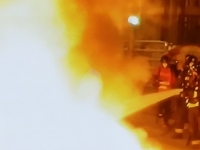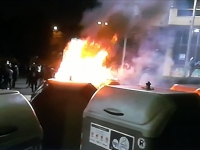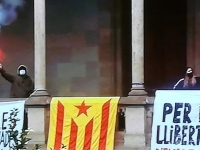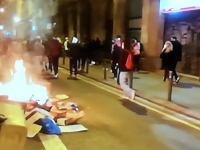News
Catalonia burns as a result of the violence unleashed in its streets
For imprisonment of rapper Pablo Hasel
USPA NEWS -
For the fourth consecutive night, Barcelona and the Catalan cities Girona and Tarragona were transformed this Friday into battlefields between young people defending freedom of expression and the Police. The riots, which spread to Madrid on Wednesday, have their origin in the imprisonment of rapper Pablo Hasél, who has accumulated four sentences for encouraging violence, assaults and insults against the King of Spain.
His real name is Pablo Rivadulla Duró, a rapper by profession. On Tuesday he entered prison, after the Police entered the University of Lleida - 150 kilometers from Barcelona, 93.20 miles - and took him into custody in compliance with a judge's order. His crimes are insulting the Monarchy, with songs with such explicit titles as "Death to the Bourbons," and praising terrorism, for which he was sentenced to nine months in prison. According to Spanish law, with that length of sentence he would not have entered prison were it not for the fact that it was his fourth sentence. In 2017, he was convicted of resisting authority and in 2018, for breaking into a premises. He accumulates another sentence for attacking a witness who was going to testify against him.
Of those crimes, the one that he has transcended is that of insults to the Crown. In his songs, Pablo Hasél describes the Emeritus King Juan Carlos I as a "drunk tyrant" and a "mafia boss", and calls for the overthrow of the Monarchy by way of violence. The Police are also the target of his songs, which he accuses of torturing and killing protesters and immigrants.
Once he was arrested and his subsequent entry into jail, protest demonstrations were called on social networks that quickly turned into real battles against the Police. Burned containers, businesses attacked, barricades in the streets and police charges are, since Wednesday, the usual scene of the Catalan streets. The riots have led to the arrest of 59 people - as of this writing - of which one is in prison and the others have been released on charges.
The protesters found significant support in the parliamentary spokesman for the far-left party Podemos, a partner in the Government of the Socialist Party, Pablo Echenique, who on Twitter expressed “all my support for the young anti-fascists who are demanding justice and freedom of expression in the streets.“ The comment unleashed a wave of criticism on social networks and also in the Spanish Parliament, where Echenique left the hemicycle on Thursday to avoid listening to the recriminations of the opposition parties. And not only they, but also the President of the Spanish Government, Pedro Sánchez, described this Friday as "inadmissible" the violence that is behind the defense of freedom of expression.
The Barcelona City Council this Friday valued the damage caused by protesters to street furniture at 500,000 Euros (USD 605,817.50). According to the Police, the protesters, summoned on social media, are led by a professional organization: they apply urban guerrilla techniques and come armed with stones and knives to confront the Police. The Catalan authorities have put the Police on alert, in anticipation that this weekend the disturbances will continue and become more serious.
Liability for this article lies with the author, who also holds the copyright. Editorial content from USPA may be quoted on other websites as long as the quote comprises no more than 5% of the entire text, is marked as such and the source is named (via hyperlink).









